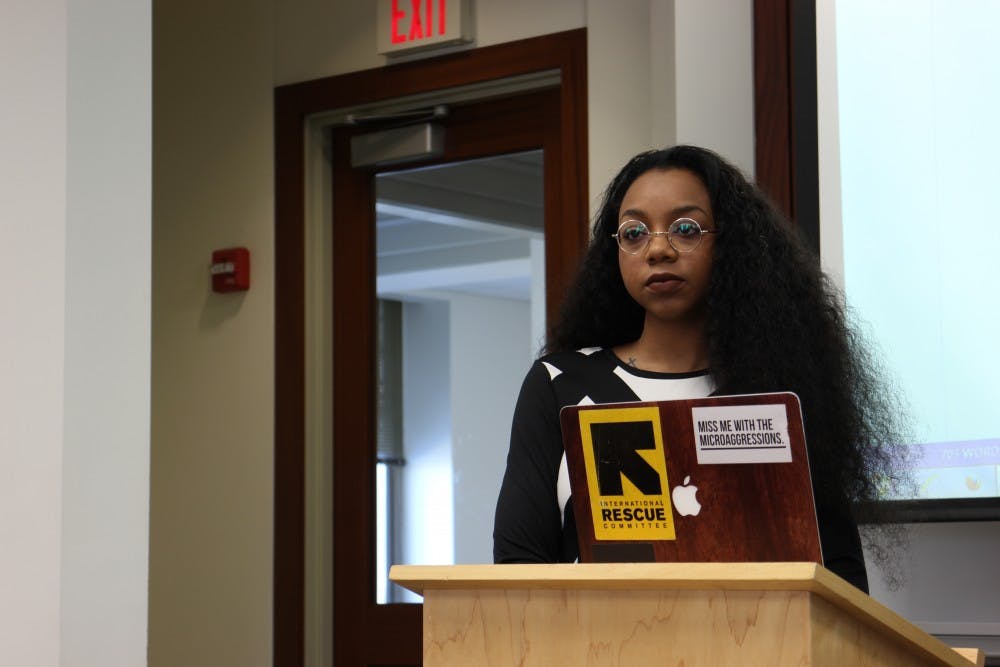At a packed meeting on Sunday, the Undergraduate Senate unanimously passed a bill requiring all Student Government office holders to undergo cultural and racial sensitivity training.
The bill, written by Kiersten Gillette-Pierce, a senator for the class of 2016, and co-sponsored by Devontae Torriente, a senator for the Class of 2018, works to combat racial insensitivity on campus.
“This is not revolutionary, this is just necessary,” Gillette-Pierce said on the Senate floor. “Every year I’ve been here, it’s gotten worse … with these trainings, at least we can’t excuse ignorance.”
The legislation is crucial, Gillette-Pierce said, because the Student Conduct Code has no specific policy for dealing with harassment based on race.
The bill outlines a plan for the trainings, which will begin next semester. The program’s success will be monitored with evaluation forms completed before and after the trainings, which SG members will submit to the Comptroller’s office. Officers who fail to comply with the mandate may face disciplinary action from their supervising executives.
Senators, for instance, would be punished by the Speaker. Current Speaker Will Mascaro said that he would either encourage the Senate to consider suspending the senator until they completed the training, or write and sign a legislative order suspending the senator until they complied.
If the program is successful, the creators hope to expand it to include members of other clubs and organizations and, ultimately, the entire campus.
The curriculum for the trainings has not yet been written. Members of the SG Diversity and Inclusion Working Group, AU’s cultural clubs and student-led racial justice movement The Darkening will design the course together, according to Gillette-Pierce.
“We’re starting it with the student leaders because they’re the ones who influence the student body the most, and by having them set the example … it makes it easier to have everyone get on board,” said Aaliyah Lambert, the coordinator of the SG Diversity and Inclusion Working Group.
Although the group has not decided on a format for the trainings, Gillette-Pierce said she envisions something similar to Empower AU, a sexual assault prevention workshop piloted during Welcome Week this year.
When the bill passed, the sizable crowd present gave Gillette-Pierce a standing ovation.Members or supporters of The Darkening made up a large portion of the audience, and the group created a Facebook event encouraging students to come, using the hashtag “#BlackOutSenate.”
The Darkening has had a strong presence at AU since the fall of 2014, when it was started by five female AU students, according to Gordon Edwards, chair of The Darkening’s Student Life Committee.
The movement’s mission is “To establish harmony on campus through fostering an environment conducive to acceptance, cultural sensitivity & love for all people,” according to its Facebook page. Since its inception, The Darkening has organized several well-attended protests and collaborated with Student Government and the Office of Campus Life to plan forums and teach-ins, The Eagle previously reported.
School-wide conversations about race relations and multiculturalism have been scarce, Edwards said. He specifically mentioned racially-offensive posts on Yik Yak, a social media app that allows users to write anonymous comments and view comments from others in the same geographic area. Commenters in the range of AU’s campus used Yik Yak to make racial jokes and post slurs at various times last school year, the Eagle previously reported.
Sunday’s Senate meeting fell just a few days after even more racist posts appeared on the app. Edwards also cited a recent incident in which the “n-word” was written on a whiteboard in freshman dorm Anderson Hall.
“Students get let off for a large majority of their offensive comments,” Edwards said.
Edwards said he sees Gillette-Pierce’s bill as “the beginning of long-term progress.” He is hopeful that the conversations it inspires will help students examine their prejudices.
“There are too many human factors to really say what its success will be, but if students keep talking about it, students keep advocating, and students keep getting involved,” Edwards said. “It will be very successful, regardless of whatever opposition is ahead of us.”





